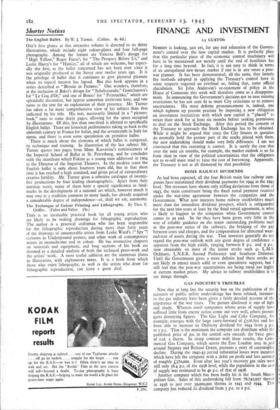FINANCE AND INVESTMENT
Ly C:USTOS
NOBODY is looking, just yet, for any real relaxation of the Govern- ment's control over the new capital market. It is perfectly plain that this particular piece of the economic control machinery will have to be maintained not merely until the end of hostilities but for a long time beyond. In fact, it is not easy to think in terms of an unregulated new tissues market if one is in any sense a post- war planner. It has been demonstrated, all the same, that latterly the methods adopted in applying the Treasury's control have in some respects required an overhaul or, failing that, some official elucidation. Sir John Anderson's re-statement of policy in the House of Commons this week will therefore come as a disappoint- ment. In announcing the Government's decision not to ease existing restrictions he has not seen fit to meet City criticisms or to remove uncertainties. His most definite pronouncement is, indeed, one which tightens up present practice by imposing a new obligation on investment institutions with which new capital is " placed " to retain their stock for at least six months before seeking permission to deal on the Stock Exchange. After this period the consent of the Treasury to approach the Stock Exchange has to be obtained. While it might be argued that since the City houses in ques.tion do normally hold the greater part of the stocks placed with them, the new undertaking should make very little difference. I am not convinced that this reasoning is correct. It is surely the case that over the next six months, for example, the market outlook is so far from clear in view of the political uncertainties that the obligation not to re-sell must tend to raise the cost of borrowing. Apparently, the Treasury is not at all dismayed by that possibility.
HOME RAILWAY DIVIDENDS
As had been expected, all the four British main line railway com- panies have maintained their dividend payments for 1944 at the 1943 level. Net revenues have shown only trifling deviations from those of 1943, the main constituent being the fixed rental payment received under the war-time agreement between the companies and the Government. What now interests home railway stockholders much more than the immediate dividend prospect, which is safeguarded for the next two years at least by the fixed rental agreement, is what is likely to happen to the companies when Government control comes to an end. So far 'they have been given vely little in the way of reliable guidance on the major outstanding problems such as the post-war status of the railways, the bridging of the gap between costs and charges' and the compensation for abnormal wear- and-tear of assets during the war. That investors generally do not regard the post-war outlook with any great degree of confidence is apparent from the high yields, ranging between 8 p.c. and 9 p.c., now obtainable on most of the junior stocks such as L.M.S. Ordinary, L.N.E.R. Second Preference and Southern Deferred. Until the Government gives a more definite lead these stocks are not likely to attract much solid or even speculative support, but I still feel that the post-war uncertainties are being rated too highly at current market prices. My advice to railway stockholders is to see things through.
GAS INDUSTRY'S TROUBLES
Now that at long last the security ban on the publication of the accounts. of public utility undertakings has been relaxed, investors in the gas industry have been given a fairly detailed account of the experience of the war years. The picture disclosed is one of light and shade. Whereas some companies whose areas of supply have suffered little from enemy action come out very well, others present quite dismaying figures. The Gas. Light and Coke Company, for example, emerges with the large carry-forward of £526,801 and has been able to increase its Ordinary dividend for 1944 from 4 p.c. to 5 p.c. That is the maximum the company can distribute while the published price of gas in the central area exceeds the basic price of rid. a therm. In sharp contrast with these results, the Com- mercial Gas Company, which serves the East London area in and around Stepney and Bethnal Green presents a story of catastrophic decline. During the 1940-43.period substantial losses were incurred which have left the company with a debit on profit and loss account of roughly L370,000. Even after last year's recovery gas sales were still only 58.4 p.c. of the 1938 level, while the population in the area of supply was estimated to be 40 p.c. of that of 1938.
- Another company which has been badly hit is the South Metro- politan Gas. Sales of this undertaking fell from 76,742,957 therms in 1938 to just over 59,000p00 therms in 1943 and i944. This F. 25W. company bas reduced its dividend from 3 p.c. to 2 p.c:


























 Previous page
Previous page